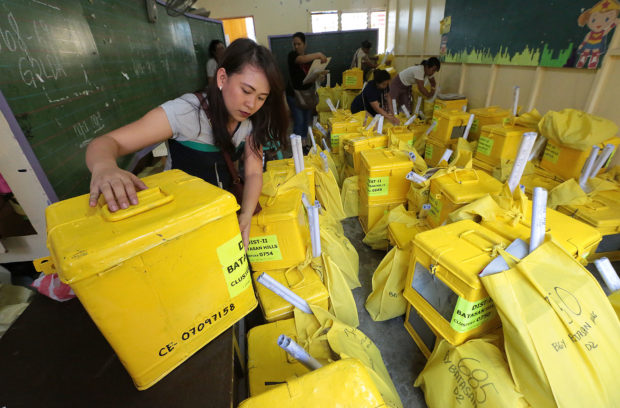Comelec sees 75% voter turnout for barangay, SK elections

POLL DUTY Teachers prepare materials at Corazon Aquino Elementary School on Batasan Road, Quezon City, on Sunday, a day before the barangay and Sangguniang Kabataan elections. —GRIG C. MONTEGRANDE
After two postponements, the barangay and Sangguniang Kabataan (SK) elections on Monday are expected to draw at least 75 percent of the country’s nearly 60 million voters, according to the Commission on Elections (Comelec).
Congress postponed the barangay elections from Oct. 31, 2016, to Oct. 23, 2017, and then to May 14 this year, enabling more than 42,000 barangay (village) officials to overstay.
Sangguniang Kabataan (youth council) posts have been vacant since 2010 with the passage of laws postponing the election of village youth leaders.
Former Election Commissioner Rene Sarmiento, now the national chair of the Parish Pastoral Council for Responsible Voting (PPCRV), on Sunday said the village elections were significant as they were coming amid efforts to change the form of government in the Philippines from unitary to federal.
Federalism
Article continues after this advertisementSarmiento said the winners in the barangay elections would, by their sheer numbers, have a “big say” in deciding whether the Philippines would shift to federalism or stay with the presidential system.
Article continues after this advertisement“Whatever form it will be, these barangay officials will still be there and it is they who will give life, vigor, dynamism to grassroots democracy,” he said.
“These officials will be at the vanguard of a massive educational campaign to inform our electorate about the pluses and minuses of a change in governmental system,” he added.
Danilo Arao, one of the leaders of the election watchdog KontraDaya (Against Fraud), on Sunday said the barangay could be used by politicians as support base for plans beyond next year’s midterm elections.
“Anything is possible in this administration . . . It could tap this support base at the village level to push for federalism,” Arao said.
“This is not just a simple, negligible exercise. In a way we can argue that the base of the political parties election machinery is the barangay so the politicians need to ensure the entrenchment of their people in the village bureaucracy,” he said.
“This explains why voters ought to choose wisely and guard their votes,” he added.
Against dynasties
Monday’s polls, which will be manual, will also put to the test the enforcement of the antidynasty provision of the Sangguniang Kabataan Reform Act, which was signed in 2016 by then President Benigno Aquino III.
The provision prohibits children related up to the second degree of consanguinity to sitting government officials from running in the youth elections.
The Comelec projects up to 45 million voters will report to 36,781 polling centers throughout the country to cast ballots using the old manual system.
Computerized elections were first held in the Philippines in 2010, 2013 and 2016.
Comelec spokesperson James Jimenez said on Thursday that the manual system would be a “novel experience, especially for the estimated 5 million first-time SK voters.”
More than 1 million villagers are vying for positions in more than 42,000 barangays throughout the country.
Two ballots
Voters aged 15 to 17 will get only the red SK ballot, while voters 31 and older will get only the barangay ballot, Jimenez said.
Those aged 18 to 30 will vote using both types of ballot, he said.
The balloting starts at 7 a.m. and the polls close at 3 p.m., after which the count of the votes begins.
The winners will be known within the day and the majority can be proclaimed before midnight, Jimenez said.
Settling ties
“We expect counting to be completed for the majority of barangays within the day because these are just small numbers [of votes],” Jimenez said.
“It is really the big barangays that are challenging, as it can sometimes take all the way to the wee hours of the next morning,” he added.
Two- and three-way ties will be settled by tossing a coin, drawing of lots or straws, he said.
Tossing a coin is the preferred way of settling a two-way tie, he added.
Positions do not come with salaries but only honorariums, the size of which depends on the financial capacity of the villages.
According to the Local Government Code, honorariums must not be less than P1,000 for village heads and P600 for councilors.
Edmund Abesamis, national president of the Liga ng Mga Barangay, is proposing permanent positions with salaries and benefits for village secretary, health worker and nutrition scholar whose work should not be disrupted when new leaders are elected.
Abesamis suggests the classification of barangays according to income, on which the salaries will be based.
Vote-buying rampant
The barangay elections are nonpartisan, but as in partisan elections vote-buying has been widely reported in the Visayas since the campaign began last Friday.
Vote-buying has been reported in various parts of Leyte, Samar, Eastern Samar, Northern Samar, Southern Leyte and Biliran, where voters are offered from P20 to P3,000 by candidates.
In one village in Tacloban City, the rates range from P50 for barangay councilor to P1,000 for barangay captain. In another village in the city, a package deal is offered—P1,200 for the entire slate.
In Bohol province, people lined up to midnight during the campaign to receive cash from candidates.
In the capital, Tacloban City, the budget for barangay captain in most villages was P200-P300 per voter. In Barangay Booy, P40 to P50 was offered for barangay councilor. —WITH REPORTS FROM ARMAND GALANG, JOEY GABIETA AND LEO UDTOHAN